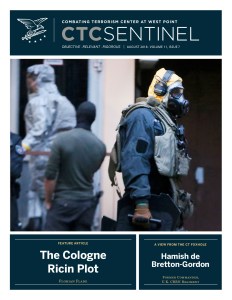From the Editor
Concern is rising over the threat of chemical and biological terror. Last month, the British newspaper The Sunday Times reported that staff at soccer stadiums in the United Kingdom were being advised on how to respond to attacks using poison gas and hazardous substances following concerns that Islamic State-inspired extremists may seek to carry out such attacks on crowded venues. There are signs the group is seeking to export expertise built up in Syria and Iraq. Last summer, an alleged terrorist cell based in Sydney that was in communication with a senior Islamic State controller allegedly plotted to build a poison gas dispersion device to potentially attack crowded places in Australia. As Florian Flade reports in our feature article, this past June, German authorities allegedly thwarted a ricin attack by a Tunisian extremist being advised on how to make the biological agent by an Islamic State-linked operative overseas. Before he was arrested, he was allegedly able to produce a significant quantity of ricin. A threshold had allegedly been crossed. Never before has a jihadi terrorist in the West successfully made the toxin.
Our interview this month is with Hamish de Bretton-Gordon, who previously led U.K. and NATO efforts to counter CBRN threats. He warns the huge disruption caused by the “Novichok” attack in Salisbury earlier this year may inspire jihadi terrorists to launch bio-chem attacks. He argues the better informed and prepared the public and emergency responders are, the less likely such attacks will lead to large-scale panic.
In late June, European security agencies thwarted a plot allegedly orchestrated by an Iranian diplomat to bomb an Iranian opposition conference near Paris attended by Newt Gingrich, Rudy Giuliani, and 4,000 others. Matthew Levitt outlines how Iranian agents have used diplomatic cover to plot terrorist attacks in Europe over the past several decades. Geoff Porter looks at the terrorist threats facing Mauritania. Jason Warner and Charlotte Hulme provide best estimates for the numerical strength of the nine Islamic State groupings active in Africa.
This month, we mourn the loss of Ambassador Michael Sheehan, who worked tirelessly throughout his professional life to protect the United States from terrorism. As the former Distinguished Chair and current Senior Fellow of the Combating Terrorism Center, he inspired a new generation of military leaders and researchers and was a strong champion of this publication. He will be greatly missed.
Paul Cruickshank, Editor in Chief
 Skip to content
Skip to content

